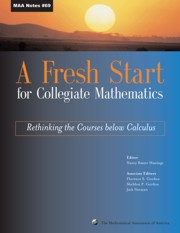Book contents
- Frontmatter
- Preface
- Contents
- Introduction
- Background
- Theme 1 New Visions for Introductory Collegiate Mathematics
- Theme 2 The Transition from High School to College
- Theme 3 The Needs of Other Disciplines
- Theme 4 Student Learning and Research
- Theme 5 Implementation
- Theme 6 Influencing the Mathematics Community
- Ideas and Projects that Work: Part 1
- Ideas and Projects that Work: Part 2
Theme 1 - New Visions for Introductory Collegiate Mathematics
- Frontmatter
- Preface
- Contents
- Introduction
- Background
- Theme 1 New Visions for Introductory Collegiate Mathematics
- Theme 2 The Transition from High School to College
- Theme 3 The Needs of Other Disciplines
- Theme 4 Student Learning and Research
- Theme 5 Implementation
- Theme 6 Influencing the Mathematics Community
- Ideas and Projects that Work: Part 1
- Ideas and Projects that Work: Part 2
Summary
Courses below calculus face a number of challenges. They need to serve two populations: students who plan to continue their study of mathematics and students who do not. They need to meet the mathematical needs of today's population of students (which is different from when many of us were in school). They need to prepare students who do continue their study of mathematics to take a calculus course where they are expected to think and understand and not just do computations. The six papers in this section describe some of the major changes that are taking place in the courses below calculus and the challenges that need to be met. Nancy Baxter Hastings, Sheldon Gordon and Bernard Madison discuss changes and challenges at the precalculus level; Don Small and Scott Herriott discuss the state of college algebra; and Janet Andersen discusses a new approach to quantitative literacy.
Nancy Baxter Hastings seeks to initiate a dialogue about some of the challenges confronting the reform of precalculus. Nancy begins by claiming: “Introductory collegiate mathematics is in the midst of a revolution.” She articulates some of the forces for change in introductory mathematics courses at the collegiate level and how these concerns are being addressed. She goes on to describe the distinguishing features of reform-based instructional materials and the pedagogical changes that the new materials have fostered in the teaching and learning environment.
- Type
- Chapter
- Information
- A Fresh Start for Collegiate MathematicsRethinking the Courses below Calculus, pp. 55 - 56Publisher: Mathematical Association of AmericaPrint publication year: 2006



